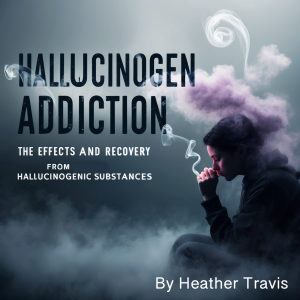

Hallucinogen Addiction
Heather Travis
This audiobook is narrated by a digital voice.
The realm of hallucinogenic substances represents one of the most complex and controversial areas in addiction medicine and substance abuse research. Unlike traditional drugs of abuse that create clear patterns of physical dependence and withdrawal, hallucinogens present a unique challenge to our understanding of addiction, as they operate through fundamentally different mechanisms and produce experiences that can range from profoundly transformative to severely disruptive. The term hallucinogen encompasses a diverse group of substances that alter perception, thought, and consciousness in ways that can be both therapeutic and dangerous, creating a paradox that has fascinated researchers, clinicians, and users for decades.
The history of hallucinogenic substance use stretches back thousands of years across virtually every human culture, where these substances were often integrated into religious, spiritual, and healing practices. Indigenous communities throughout the Americas, Africa, and Asia developed sophisticated ceremonial contexts for the use of naturally occurring hallucinogens such as psilocybin mushrooms, ayahuasca, peyote, and iboga. These traditional uses were typically characterized by careful preparation, community supervision, and integration of the experience into broader spiritual or therapeutic frameworks. The disconnect between these traditional ceremonial uses and modern recreational consumption patterns has created much of the complexity surrounding contemporary hallucinogen addiction.
Duration - 1h.
Author - Heather Travis.
Narrator - Digital Voice Archie G.
Published Date - Tuesday, 21 January 2025.
Copyright - © 2025 Heather Travis ©.
Location:
United States
Description:
This audiobook is narrated by a digital voice. The realm of hallucinogenic substances represents one of the most complex and controversial areas in addiction medicine and substance abuse research. Unlike traditional drugs of abuse that create clear patterns of physical dependence and withdrawal, hallucinogens present a unique challenge to our understanding of addiction, as they operate through fundamentally different mechanisms and produce experiences that can range from profoundly transformative to severely disruptive. The term hallucinogen encompasses a diverse group of substances that alter perception, thought, and consciousness in ways that can be both therapeutic and dangerous, creating a paradox that has fascinated researchers, clinicians, and users for decades. The history of hallucinogenic substance use stretches back thousands of years across virtually every human culture, where these substances were often integrated into religious, spiritual, and healing practices. Indigenous communities throughout the Americas, Africa, and Asia developed sophisticated ceremonial contexts for the use of naturally occurring hallucinogens such as psilocybin mushrooms, ayahuasca, peyote, and iboga. These traditional uses were typically characterized by careful preparation, community supervision, and integration of the experience into broader spiritual or therapeutic frameworks. The disconnect between these traditional ceremonial uses and modern recreational consumption patterns has created much of the complexity surrounding contemporary hallucinogen addiction. Duration - 1h. Author - Heather Travis. Narrator - Digital Voice Archie G. Published Date - Tuesday, 21 January 2025. Copyright - © 2025 Heather Travis ©.
Language:
English
Chapter 1: The Complex World of Mind-Altering Substances
Duration:00:10:17
Chapter 2: Neurochemical Pathways and Brain Effects
Duration:00:12:13
Chapter 3: Patterns of Use and Addiction Development
Duration:00:12:10
Chapter 4: Treatment Approaches and Therapeutic Interventions
Duration:00:12:57
Chapter 5: Prevention and Harm Reduction Strategies
Duration:00:13:12